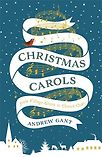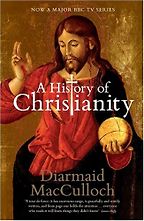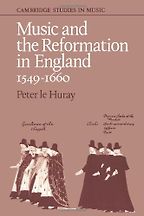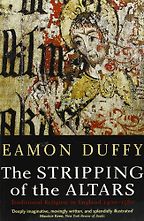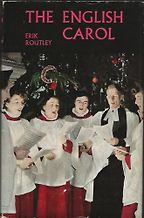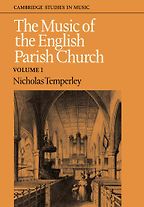A report that came out last week on religion in the UK highlights the fact that roughly 40% of people in 1983 identified as Anglican, and only about a fifth of people now would. What does this mean for the future of church music in the UK?
Well, it means it’s got to find a way through this particular challenge. One of the things that I found in writing this book was that the tradition of English church music has constantly had things thrown at it, and it has always managed to find a way through them, and it’s been absolutely fascinating. This is a challenge, but compare it to, for example, the divisions around the rise of non-conformism, and the re-establishment of the Catholic hierarchy in the 19th century, around anti-Catholic sentiment in the 18th, worst of all the Civil War in the middle of the 17th, the Reformation in the 16th. When similar things happened in other countries, church music was effectively cut off at the knees. In France, for example. But English church music always found a way of keeping going, and I think there are a number of reasons for that.
What are the reasons?
Nicholas Temperley, one of the leading scholars of this history, has a wonderful phrase for it, he says it’s just because the English just love to sing. I think that it’s a Protestant thing and it’s a northern European thing, but he’s absolutely right. Another reason is that we have these wonderful buildings which have a place for the music actually built in. So if you live near a wonderful medieval parish church which has carved medieval choir stalls, somebody is going to say, hang on, let’s go in there and sing, and that will always happen.
You’ve written on Christmas carols and Christmas is coming up. Obviously it’s becoming more secular, or has become so. What do you think the role of carols and church music is in a modern Christmas. Are they returning to their roots in folk songs?
Yes, I think that’s true in a way. It’s almost a full circle. When you start looking at the history of carols you discover they come from everywhere and anywhere and nowhere all at the same time. Some of the carols we sing were written by poets and composers. Beyond that there’s a whole tradition of folk songs and tunes that come from completely different contexts, like songbooks, or secular songs, or dancing manuals in one case. When you go back into the historical undergrowth, as it were, you find carols that really have nothing whatever to do with Christianity, or church, or even words. A carol could be just a party song, or a dance, or just a celebration for keeping yourself warm and having a good time. Later, Christian concepts begin to get attached to them, but not by any means exclusively for Christmas. A lot of the original folk carols would tell the entire Christian story. You’d start with the Creation, and work through the life of Christ from the Nativity, right the way through to the Passion and Resurrection. With ‘Tomorrow Shall Be My Dancing Day’, for example, we tend to just sing the three verses in the middle that deal with Christmas, but there’s a lot more to it than that.
“The tradition of English church music has constantly had things thrown at it, and it has always managed to find a way through them.”
I did an American edition of this carol book, and I was told that if it was going to be sold in America, I had to include ‘Jingle Bells’, so I did. Well, ‘Jingle Bells’ is a song about a man taking his girlfriend for a ride in the snow, and falling out of the sleigh, and ending up flat on his face, nothing very Christian there. But is that in the tradition of the midwinter, good time, party song? Absolutely, yes it is.
I was thinking about all of the bits of carols that made absolutely no sense to me, such as ‘In The Bleak Midwinter’ and ‘I Saw Three Ships’, songs about winter or the coast, when the Nativity was in the Middle East.
Then you try and unpick those stories, and there’s all sorts of possible layers of meaning, but of course, one of the great things about it is that you can never say this explains it, because you can’t, who knows? It’s a muddle, it’s like a pudding really.
I read that the Interregnum and the Puritans really put paid to the celebration of Christmas, essentially until Dickens came along. Did they have the same effect on church music?
Oh, absolutely, yes indeed they did. That was, without doubt, the most serious threat that church music has ever faced: the period of Puritan rule in the middle of the 17th century. The fact that the government of Oliver Cromwell banned Christmas is often talked about, but it needs to be seen in context, they banned an awful lot of things. It wasn’t that they had a particular problem with Christmas, they were Puritans, they didn’t like elaborate celebration of the liturgy, or of anything really very much. Their worldview was ascetic and disciplined. Church music didn’t have to wait until Dickens to come back again. In the Restoration, church music came back with a tremendous swagger and flair into the world: Henry Purcell, John Blow, and that kind of music.
Your first book choice is A History of Christianity by Diarmaid MacCulloch. Tell me about this book.
It is a history of the whole of Christianity, but he has a wonderful subtitle: A History of Christianity: The First Three Thousand Years. It takes a little bit of thinking about because you think, “Hang on, surely he means two thousand years?” He doesn’t, of course, because he refers back to the Old Testament, and the history of Christianity before Christ. It’s a hugely ambitious book, but it’s just wonderfully told, and it’s full of such variety and colour, but also a tremendous amount of sympathy. He’s a very erudite, cultured writer, and I enjoyed this book very much.
You mentioned earlier that the history of Christianity is the history of church music, could you elaborate on how those two things interlace?
Music has been around as part of the celebration of Christianity since there has been Christianity, which, to follow MacCulloch’s idea, means long before Christ. The Old Testament liturgy would be chanted. If you think of the Book of Psalms, for example, it’s full of references to music, and quite detailed and elaborate references to music: “Praise him in the cymbals and dances, praise him on the strings and pipes,” the loud organs, all of this kind of thing. This is an English translation, of course, that was made in the middle of the 16th century but it’s there in the Latin vulgate, and it’s there in the original Hebrew (I don’t read Hebrew but so I’m led to understand).
What you don’t have, of course, is any music. There’s no written music, there’s no obvious evidence what the music was. But there is enough evidence that there was music, MacCulloch talks about this: there are indications that it was sung, and some indications about how it was sung. For example, certain words are picked out in a certain way, which he takes to indicate that they were treated to a certain kind of emphasis when the liturgy was sung. You’re working in this fascinating field of having to imagine something from a very disparate collection of clues. MacCulloch has identified a church in Aleppo, which he describes as perhaps the best survival of the very earliest Christian tradition, and he suggests that the way that the liturgy is sung there is not dissimilar to the way it would have been sung in the days of St Paul. You can hear this online.
Then, of course, you have to go a thousand years on before you start to get any notes written down on paper, even then the earliest kind of notation is pretty difficult to interpret with any kind of scholarly authority. You have plainsong, and plainsong lasted for a very long time and became extremely elaborate and varied, to the extent that some scores of plainsong are full of little squiggles, and lines, and dots, and dashes which, even now, people don’t understand.
Then the first two part music is written in the form of the Winchester Troper, from the 11th century, before the Norman conquest. Here, you have a written text, words, with what look like musical symbols over the top. Some of them look quite like modern symbols—like the tails of quavers—but there are no stave lines. You can see that the musical line goes up and down, but you don’t know exactly where, or by how much. Now, what’s happening there is that one singer would be singing that text to the Plainsong tune, which all the monks in the monastery already knew, because they learnt it as children, and had sung it from memory, and were singing it all their lives, and the other guy would be reading from this Troper, and would be improvising or adding a kind of embellished second line over the top by following these little dots, and dashes, and squiggles. So, you’ve got two part music which has been composed by somebody, but you don’t really know how it goes.
You touched briefly on the fact that church music in other European countries has suffered in a way that it hasn’t in England, is this something that this book illuminated for you?
This is another thing that I try to look at in my book: the extent to which the tradition of church music is affected by the social, and political, and intellectual currents that are going on around it and the extent to which it reflects back the lives of ordinary people, and it really does. In France, for example, before the French Revolution there was a wonderfully rich tradition of art music in the Church, composers like Lully, and Rameau, and Charpentier, during the reign of Louis XIV and beyond, which ended at the Revolution, which was passionately anti-clerical, very against the Church. So that was that, it really didn’t find its feet again until the late 19th century with the great French organ composers, Vierne, and Widor, and others, writing Mass settings for those enormous cavernous churches with enormous organs, or usually two organs. But England somehow managed to hang on to its tradition.
Your next book is Music and the Reformation in England by Peter Le Huray.
This book deals with a rather distinct and contained historical period. He looks at how the Reformation affected composition for the English Church from the day that it started, effectively, from the day the Henry VIII decided to make himself head of the Church, through the reign of Elizabeth I, and into the Jacobean period. It’s what you might call an old-fashioned work of scholarship. It looks at every source, at every piece, and it puts them into context. Again, he writes with the sort of compassion and understanding of a scholar, a musician, a practitioner, and a human being, if I can put it like that.
Absolutely you can. I was thinking about Thomas Tallis and the fact that he could still write in Latin, and other strange compromises that happened after the Reformation.
Yes, absolutely. Le Huray deliberately writes only about music for the Reformed Church. So, for example, he would refer—in the context of Tallis—to the English service music that he composed, and he doesn’t concern himself with the Latin music. But what happened before these texts were produced is absolutely fascinating, and that’s something that this book really opened my eyes to. Before the Book of Common Prayer in 1549, there had already been some moves towards writing music in English, the very earliest settings of the Communion in English, for example, from books like the Wanley Partbooks. You can look at these in facsimile and see the composers trying to find their way. You can see them sitting down with this blank piece of paper and thinking, “Well, how do we do this, this is new, we’ve never done this before.” They’re having a go. Some of it works, and some of it doesn’t. It’s a real window into working people, working musicians trying to provide something for people to use.
How would the Reformation have changed the local service?
Well, radically, and fundamentally, and totally, and completely. But, this is now getting on to another of my books, The Stripping of the Altars by Duffy. There are fascinating accounts of how some people are told, “You must stop singing in Latin, and you must now sing in English.” So they say, “OK, yes sir,” and they sing in English, but they sing it to the same tunes, and they sing it with a kind of funny accent so they make it sound as much like the Latin as they possibly can, and it sounds funny now, but there are several accounts of this.
Let’s talk about Eamon Duffy’s book.
Duffy is a Catholic and he is writing very much from the point of view of Catholic England. This book, The Stripping of the Altars is, in a phrase that he uses, a description of the funeral rites of Catholic England. The basic thesis of his book is that we have come to accept this idea that the pre-Reformation Catholic Church was corrupt, and was venal, and was full of fat friars feathering their own nests and rich people paying for indulgences to buy their soul into heaven so they didn’t have to do any good works. He says there’s more to it than that, that this was an extremely rich cultural tradition that ran through every strand of English life.
And was music a big part of that?
Yes, absolutely it was, and here you start to move away from music written by professionals, or written for professionals, and into music that exists for ordinary people: parish ceremonies, beating the bounds, going around the parish with a banner of your local saint, singing hymns as you go. Again, of course, we don’t know what the music was, nobody wrote it down. This was all folk song, there’d be no point writing it down because nobody could read it. They learnt it from each other; it’s an oral tradition. This is English church music in exactly the same way that ‘Stanford’ in G, or the Byrd Masses are English church music. They come from different places, but they’re all part of the tradition.
Obviously music is a highly affective and personal medium. Do you think the loss of these traditions at the time of the Reformation would have been a personal tragedy for the people involved?
Yes, it would indeed. Certainly for trained professional composers. I mean you’re talking about losing everything, your livelihood, your job, sometimes your home if you had a job working in a monastery. That happened to Tallis at Waltham Abbey. Perhaps more importantly than that, you had spent your life, from a very early age as a small child, learning these skills that had been handed down to you by your forefathers, built up over hundreds of years, and suddenly they weren’t needed anymore, nobody wanted them, so what were you going to do?
“A great many leading composers of music for the English Church during the 20th century would by no means have described themselves as Orthodox believers.”
But an interesting part of this story is the way that people dealt with that. They were very creative, a lot of these people were obviously very clever, and very able operators. People like Tallis and Byrd, who lived through these periods of change, always found a way. They actually ended up doing very well out of it. It didn’t always go in a straight line, but they made it work.
I wonder if they found they were pushed to their limits, and then something even more exceptional came out of them?
That is one of the staggering things about it. Take a composer like Tallis, he was faced with so many challenges which came completely out of the blue. Tallis not only managed all the changes, but he contributed music to each period of change which is just perfect. That’s the thing that I think is just dazzling and mind-boggling about Tallis. You go from the early medieval type music, like an early piece, the ‘Alleluia’ for example, through those perfect little miniatures, ‘If Ye Love Me’ and ‘Hear The Voice And Prayer’, you’ve got the ‘Missa Puer Natus Est’ and the big Marian antiphons of Queen Mary’s reign, and then on into the ‘Cantiones Sacrae’ which he composed with Byrd in the 1570s when he was an old man. Not to mention pieces like ‘Spem In Alium’, and the English service music. Here was a composer who just had the rulebooks of his art torn up in front of his eyes every four or five years, and just did it better.
Let’s move on to The English Carol by Erik Routley.
I wanted to feature Erik Routley because he’s been a bit of a discovery of mine since I started writing these books. He was a priest, he lived and worked in the latter half of the 20th century, he was a hymnologist, he was very interested in English hymns. He wrote about the Wesley family—John and Charles, through Charles’ two sons, Samuel and Charles junior, and then Samuel Sebastian—and he wrote this book called The English Carol.
He is my kind of writer, and I think he should be read more today. He not only knows his subject inside out he also just loves it, but not uncritically. He is passionately committed to it, but he is aware of its oddities and its inconsistencies. Above all he writes with this wonderful twinkle in his eye. There’s the occasional little joke creeping in. When he’s talking about two different versions of one particular carol he says that one of them has the atmosphere of the town, it’s a kind of constructed thing, and the other one has very much the feeling of a country carol. So he describes going from one to the other as like approaching Wolverhampton from the North by train.
I read in one of the reviews of your book that the best church music can sometimes be written by non-believers, do you think that’s true?
There’s no doubt it is true, yes. MacCulloch writes rather movingly about this actually, and I quoted from him at the end of my book. Certainly in the last 150 years or so—before that it’s difficult to say because the matter of belief was rather less equivocal, effectively there was no such thing as an atheist, that’s not entirely true, of course, because during the Enlightenment there were—it begins to be possible for establishment figures to be openly free-thinkers—to use the term of the time—and, of course, musicians and composers are by definition people who think freely about things, they are creative spirits. A great many of the leading composers of music for the English Church during the 20th century have been people who would by no means have described themselves as Orthodox believers, including some in whose cases this might be rather surprising, like Parry, for example.
And Benjamin Britten?
Well, Britten had a very conventional upbringing: churchgoing, small town, East Anglia. I think as a young man he would have considered himself to be a fairly conventional Christian, but I don’t think he would as an adult. Certainly Vaughan Williams, whose father was a vicar, wasn’t. Michael Tippett very much wasn’t, nor was Herbert Howells, and there you have some very important contributors to the tradition.
What effect does that have on the spirituality of the music, if any?
That’s an interesting question. We’re getting into rather philosophical territory here, but I feel it’s possible to hear these composers using the liturgy and the words of the Church of England as a work of art. The point of a work of art is to try and explore the human condition. I think that you’ve got composers here who are saying these words, this tradition, represents a monumental, very profound, very moving, and beautifully expressed attempt to make sense of what it means to be human. Now I, as an individual, can’t pretend that I think that it has found the answers, but I find that the manner of the investigation is worth my while, worth being part of, I think that’s partly how I see it. I was lucky enough to have a conversation with Sir Peter Maxwell Davies about this, and he very kindly allowed me to quote from this in my book. He said “I admire the Church as a work of art, but I find it very difficult to believe.” There will be some who find that statement difficult, possibly even unwelcome, but he has contributed some wonderful music.
I wonder if uncertainty as a precondition for creating something is more helpful than complete certainty?
Well, it’s all down to the individual isn’t it? A more extreme example would be Michael Tippett, who was clearly a free-thinker in all sorts of ways, not by any means a conventional believer in any kind of orthodox system. But it didn’t stop him writing church music. He wouldn’t write anything that contained any statement of belief, but he was able to compose a Magnificat and Nunc dimittis for my old college: St John’s, Cambridge. But when he was asked to write a piece for Canterbury Cathedral, he tied himself into knots trying to find a text that he could live with, and he ended up with a Latin medieval poem about angels, which is great, why not?
Get the weekly Five Books newsletter
But let’s be clear, this isn’t everybody. You say, do you think that is a creative thing, that sort of tension inside the personality, and yes, in the case of these people, absolutely it is. But at the same time you’ve got a composer like James MacMillan for example, whose faith permeates every aspect of his creativity, and, again, with absolutely wonderful musical results.
Shall we move on to the last book, The Music of the English Parish Church by Nicholas Temperley?
The interesting thing about this book is that it deals very deliberately with a side of English church music which is fascinating, and important, and wonderful, and rich, but largely ignored. That’s to say, not music for professional choirs, written by professional trained composers that we’ve all heard of, but music for the ordinary man, and woman, and children in the pew: music for the parish church. Temperley says in his introduction that he got interested in this and started reading about it, and was astonished to discover that nobody had actually studied it systematically, so he decided that’s what he was going to do, and he came up with what is clearly the defining work on that subject.
What characterises this style of music?
Practicality, I think, more than anything else. This is music that had to be written for use by ordinary people, people who at some periods had some musical knowledge, but not terribly much, so it had to be accessible. It had to be liturgically acceptable, which meant obviously it was in English. But it was music that had to fit with what you had. For example, in music for the ‘musickers’ as they were known—the people who made music in a choir up to the middle of the 18th century—the tune was in the tenor, because you had mostly men and your farm labourers would bellow out the tune and that was all fine. Then when you get into the 19th century you start to get the vicar’s wife training up the children of the Sunday school, and the girls, to sing tunes. Then the tune migrates into the treble. These little details in the score tell you something about society, and the way things were changing.
Is this music that’s still used in parish churches, or is it something that follows different trends and fades away?
Some of it is, yes. Our English church music tradition has been able to absorb anything and everything. Our hymn tradition comes from all over the place. A hymn like ‘The Spacious Firmament On High’ for example, was originally composed with this treble-type setup. Whereas the hymns that are often in three-time like the tune Rockingham, ‘When I Survey The Wondrous Cross’, was originally written in one of these country songbooks—of which there were a great many at the end of the 18th, beginning of the 19th century—with the tune in the tenor. A fascinating aspect of parish church music is when the choir started to develop, and a separate group of people would make a piece of music on their own. You get some wonderfully characterful bands of singers and instrumentalists, in particular in the West Gallery tradition at the turn of the 19th century, described tremendously vividly by Thomas Hardy in Under the Greenwood Tree, and elsewhere. There’s a huge amount of it in church cupboards all over the country, particularly in the South and West of England, but it’s only in the last 30 years or so that people have started to dig it up and have a look at it.
I wonder what the next adaptation of church music will be. Is this something that you have any clues to?
Hymn singing?
Yes, and parish music in general.
Well, there have always been challenges, and people have always risen to them. There are still companies which put a lot of time and effort into producing hymn books. I’ve worked a little bit over the years with Kevin Mayhew who runs a publishing company which is dedicated to providing music for parish church use, so you’ll write a piece and then be asked to arrange it for organ with no pedals, and an organ with one note in the pedals, and then an organ with slightly more elaborate pedals. He has produced a hymn book, Hymns Old and New, which seems to address exactly that; what key should it be in, where should the tune be, how many parts should it be in, all of this kind of thing, so the debate goes on.
Five Books aims to keep its book recommendations and interviews up to date. If you are the interviewee and would like to update your choice of books (or even just what you say about them) please email us at [email protected]
Five Books interviews are expensive to produce. If you've enjoyed this interview, please support us by donating a small amount.

